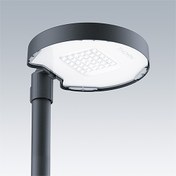Carat / CT S 24L105-730 NR CL2 T60F ANT
96634289
▼ Data Sheet
An elegant urban lantern with durable performance. Programmable LED driver, set for fixed output, driving 24 LEDs at 1,05A. Body: small size, Die-cast aluminium (EN AC-44300), powder coated textured anthracite (close to RAL7043). Shaft: anthracite (close to RAL7043). Cover: glass. Fixings: stainless steel with anti-galvanic treatment. Narrow Road optic, with Colour Rendering Index min.: 70 Correlated colour temperature: 3000 Kelvin LEDs supplied. Class II electrical, Impact strength: IK08, IP66, Ta max.: 35°C. Supplied with Ø60mm spigot adaptor pre-fitted for post-top, 5° tilt.
Surge protection: 10kV single pulse common mode and 8kV multipulse common mode and 6kV multipulse differential mode. If permanent DALI system is connected, 6kV multipulse common and differential mode.
Dimensions: Ø435 x 81 mm
Luminaire input power: 78.6 W
Luminaire luminous flux: 10431 lm
Luminaire efficacy: 133 lm/W
Weight: 7 kg
Scx: 0.04 m²
- LED
- CE
- ENEC11 +
- ENEC11
- GLedReP
- IDA
- IK08
- IP66
- Coastal_C5
- LLedNr
- SC2 - Protection Class 2
- Ta=35°C

